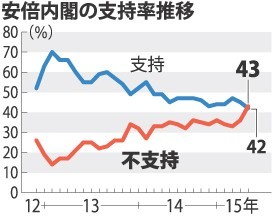 mainichi.jp
mainichi.jp As the poll numbers revealed, more than half of the respondents (61%) voiced their opposition to the proposed changes to national security laws currently being debated in an extended session of the Diet. The same figures also showed that 76% of respondents believed that the comments made at the Young LDP study session mentioned last week had negatively affected their opinion of the government, a point that one member of the LDP’s coalition partner the New Komeitō commented on when saying “the LDP have been scoring own goals one after another” (J).
Particularly telling was the 81% of respondents who said that they did not believe the Abe government had provided an adequate explanation as to why changes to the security laws were necessary, with 52% saying that the proposed changes to security laws were, in their view, unconstitutional. Furthermore, 61% of respondents said that they did not agree with the government extending the current session of the Diet so that these security laws could be enacted (J).
So, what does all this reveal? The government is well aware that its recent performances in the Diet have given Japan’s citizens a lot of pause for thought, and that if it attempts to ram through its security legislation without an adequate explanation, support for the government may fall even further (into the ‘dangerous’ 30% level). Whatever the message about the need for a greater degree of flexibility in Japan’s defence posture, clearly that message is not echoing with the population at large. Japan’s population is still wary of the direction that the Abe government is trying to take it, and the concern that ‘too much is happening too quickly’.
No politician in Japan is immune from poll judgment, not even Shinzo Abe, so any downward movement in popularity is bound to lead to speculation of whether Abe has already passed his peak. In an Australian context this is something of a concern. If Abe is forced to modify his stance on changes to the national security laws in order to recover support, this means that the more ambitious agenda that he has for Japan’s security relations with Australia will have to be put on hold. That will disappoint both the Abbott government and, by association, the Obama administration and mean that the entire concept of greater trilateral co-operation will have to be postponed until Japan sorts out its reformed security position.
Japan recently had a general election, so calling yet another election so soon after the last one in order to test public attitudes towards national security would be a deeply unpopular move and is not a viable option for Abe. The downturn in support for Abe is likely to embolden his inter-party LDP opponents, most notably Ishiba Shigeru, and give them more cause for promoting themselves as alternative leaders to Abe. While the numbers suggest that Abe is secure for now, if this trend continues well into September (when the extended session is scheduled to end), then questions will be raised about Abe’s ability to bounce back.
Abe has weathered adversity before, and stormed back into the PM’s seat after years spent in the political wilderness. This is the first indication that he has to improve his sales technique if he is to bring the Japanese population back on side, and that the path to a greater regional role for Japan may be more difficult than anyone anticipated.
*It should be noted that this Thomson Reuters article from last Monday quoted Nikkei and TV Tokyo poll results which were pretty much the same as those in the above Mainichi article, meaning that 1) community sentiment is consistent no matter which organisation undertakes the poll, or 2) most newspaper corporations use the same survey companies for their poll results.
 RSS Feed
RSS Feed